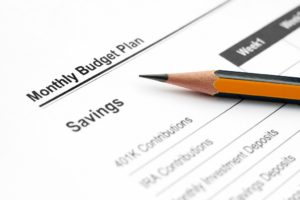 Women have unique financial needs. On average, women live longer and earn less than men. Women may have gaps in employment that impact their financial futures, such as retirement benefits. Women are impacted more severely than most men by events like divorce and widowhood. And, more women lack financial knowledge and experience.
Women have unique financial needs. On average, women live longer and earn less than men. Women may have gaps in employment that impact their financial futures, such as retirement benefits. Women are impacted more severely than most men by events like divorce and widowhood. And, more women lack financial knowledge and experience.
It is estimated 85% to 90% of American women will be on their own financially at some point in their lives. Some women will never marry. Some will see their marriages end in divorce and some will outlive their husbands.
So, let’s explore some keys to personal finance that all women need to know.
Keys to Personal Finance
Write Down Your Financial Goals
 Set personal goals, family goals and if applicable, business goals. Dream a little and make a “bucket list.” Set short term goals, like saving for gifts or new tires for your car. Set long term goals like a vacation, a college fund, buying a newer vehicle or a house. You can work on more than one goal at a time. Make SMART goals and “do the math” to calculate the savings required each month or pay period. What gets written down and planned, gets done.
Set personal goals, family goals and if applicable, business goals. Dream a little and make a “bucket list.” Set short term goals, like saving for gifts or new tires for your car. Set long term goals like a vacation, a college fund, buying a newer vehicle or a house. You can work on more than one goal at a time. Make SMART goals and “do the math” to calculate the savings required each month or pay period. What gets written down and planned, gets done.
Pay Yourself First
Save early, often and automatically. If possible save through an employer-based tax-deferred retirement savings plan. If your employer matches your savings for retirement, save at least the maximum match amount. You can also split your paycheck and deposit it into checking and savings or investment accounts.
Develop a Spending Plan (Budget)

Reduce expenses to achieve your financial goals. Include savings for future financial goals and/or emergencies as a “fixed expense.” Use apps or websites like PowerPay, PowerPay Debt Elimination, or a worksheet to keep track of spending. If you are going to use a website or app, make sure you understand the monthly cost for budgeting. Do your research to make sure that the app or website like mint.com is secure for your personal information. Be careful about sharing your account information. Avoid costly debt by spending less than your income.
Maintain Good Credit in Your Own Name
Check your credit file at least once a year at annualcreditreport.com. Correct any errors with the major credit bureaus. Learn more about Credit Reports and your Credit Scores. Pay your bills on time, as this counts for 35% of your credit score. Avoid charging over 50% of your available credit. Avoid co-signing loans for other people.
Deal with Debt
Having credit accounts and carrying some debt is common these days. Ideally, you should aim for a debt-to-income ratio of 15% or less. People with ratios between 15% and 20% may be experiencing problems making their payments and still paying other bills on time. Calculate Your Debt-to-Income ratio
If using a credit card, seek out a low-rate card through Bankrate and Evaluating Credit Card Offers worksheet.
Don’t be afraid to negotiate a lower rate with your card holder by calling and talking to the manager on duty. Set up a strategy to pay down multiple credit accounts using the online tool – PowerPay . It calculates the fastest way to pay down accounts and save the most money.
Smart Tax Strategies
 Often small business and households with significant income will do year-end income tax planning to estimate taxes and explore strategies to reduce their tax burden. An often overlooked option is creating or adding to an Individual Retirement Account (IRA) or tax-deferred savings or investment account. Before contacting an investment broker or manager, check out the guidelines for various retirement plan types.
Often small business and households with significant income will do year-end income tax planning to estimate taxes and explore strategies to reduce their tax burden. An often overlooked option is creating or adding to an Individual Retirement Account (IRA) or tax-deferred savings or investment account. Before contacting an investment broker or manager, check out the guidelines for various retirement plan types.
Build Wealth – Track Your Net Worth
 Calculate your net worth (assets minus debts) regularly – at the end or beginning of the year. You can build wealth throughout your life by investing in assets that increase in value such as a home or real estate. Paying down the debt is also important for increasing your net worth.
Calculate your net worth (assets minus debts) regularly – at the end or beginning of the year. You can build wealth throughout your life by investing in assets that increase in value such as a home or real estate. Paying down the debt is also important for increasing your net worth.
Compound interest is your BFF if you are investing money and building wealth over time. It is your worst enemy if you are making minimum payments on credit cards and paying interest.
Develop and Maintain Your Human Capital or Value
Never consider your education finished. Continue to learn new information and new skills. Keep up with computer and technology literacy. Practice good health habits to maintain your health and prevent costly medical bills. Never stop learning about personal finance. Devote at least 15 minutes a day learning something new about money management. Information sources include web sites, Twitter chats, seminars, and mass media. Keep developing YOU as an individual.
These keys will help you achieve financial success, reduce financial stress, live a more comfortable life, feel secure and financially independent and plan for a comfortable retirement.


It is great to be reminded about what I should be doing regarding my personal finances. Never too old to learn